"Cry me a river" - from biology to psychology of tears
Did you know that humans are the only beings that have tears that can be emotionally triggered? As far as the evolutionary biology is concerned, we have them because they obviously served a purpose in our development. Some think that they were a signal that we were in a distress and recent studies show that you can not remain with your angry approach to someone if that someone starts crying. When a person in front of us cries, thinking processes in our brain seems to slow down and we forget about everything with focusing only on that person and the tears.
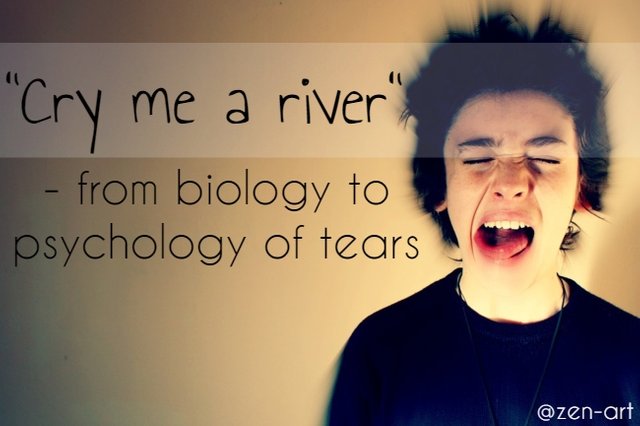
CC0 licence, Pixabay, author: Alexis, adapted by me
In this post, I will try to convince you that tears are not only normal from a biology standpoint but also make a point how they are extremely healthy for our psyche and overall well being. You know me, let's learn something and have some fun while we're doing it! 😎
"Live like you are going to die tomorrow,
learn like you are going to live forever."
Mahatma Gandhi


Tears are produced by the lacrimal gland (located on the upper right from the eye, below the eyebrow) and there are 3 types of them; BASAL, REFLEX, and EMOTIONAL. If you are healthy, you have no problem with producing either one of those but there are people out there suffering from keratoconjunctivitis sicca, a condition that limits tear production. It is very inconvenient but not a serious condition if treated properly with artificial tears that contain polyvinyl alcohol, glycerin, and carboxymethylcellulose. Why those chemicals? Because they mimic natural chemicals usually found in tears.
Tears have three layers;
oily, aqueous, and mucous.
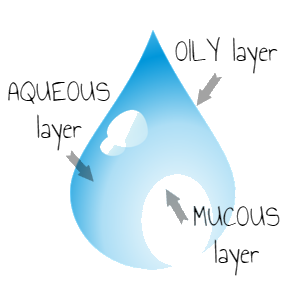
Tear layers, image created by me
The oily layer (produced by the meibomian gland) protects tears from evaporating or spilling out from the eye. The watery layer is in the middle of the tear and it contains water, electrolytes, glucose, and proteins. The center of the tear is the mucous layer (produced by goblet cells from the conjunctiva ) that coats the cornea and helps the tear stay on the eye. The mucins keep the tissue moisturized providing a gentle distribution of the aqueous layer over the entire eye. You can see those layers in my little graphic on the right.
Now that we know the chemistry of tears, let's see what those three types are and when do we get them.
One of the types is the REFLEX TYPE. This type serves as a protection of eyes against various irritations from smoke and wind to those nasty onions that I always hate cutting. This type is called reflex because the sensory nerves in the cornea tell the brain there is an irritation going on and the eye receives a message to produce more tears to get rid of it. The chemical composition is very similar to that one of basic type except this type contains more antibodies to fight those irritations.
From the three types, we produce one of them almost all the time, you've guessed it, it is the BASAL TYPE. These tears protect the cornea and keep our eye clean and hydrated. They contain lysozyme which protects against infection and as we grow older we produce less and less of them. On average, we produce around 1.2 ml of them every single day and they are usually drained through the nasal cavity. Hm... Time for a funny digression/story...
A couple of years ago when I was getting my nose pierced, a lovely lady with a needle in her hand told me not to be alarmed when I start crying. My response was laughter because I already had 2 tattoos done and how much painful can a quick pierce be from getting a tattoo, right? She explained that it had nothing to do with pain and everything to do with the mucous membrane in my nose and that tears will begin to flow from the eye opposite from the side of my nose I was getting pierced. Lady with a needle was right and it was a really freaky experience. When you cry, you cry because something hurts, burns, bothers your eye or because of your emotions. You feel something, emotionally or physically. This was different. Only one of my eyes got flooded with tears (a lot of them), and I could not feel a thing, not even in the eye. The only sensation I had was the feeling of water on my cheek. Till this day, that was the freakiest thing my body has ever done.
Ok, digression done, let's get back. The last type of tears is EMOTIONAL TYPE. These tears contain hormones prolactin, adrenocorticotropic hormone, and Leu-enkephalin. We call those hormones the stress hormones because they are (obviously) caused by stress and when their levels become too high they become toxic and bad for our health, physical and psychological, so getting them out of our body in tears is crucial for our well being.
There are many quality papers on tears. If you are interested, I would suggest you take a look at this one regarding the lipids in tears:


We know that emotional crying helps our health from the standpoint of releasing pressure and getting rid of stress hormones but according to evolutionary biologist Dr. Oren Hasson from the Tel Aviv University, the emotional benefits, and stronger relationships as results of tears are now backed up by empirical evidence.
His analysis showed how tears are actually an evolutional mechanism for bringing people closer together. By blurring our vision, tears provide information about submission. His research, in which he investigated 3 types of tears (joy, sadness, and grief ) and the sincerity of the tears, was published in the Evolutionary Psychology. Among other things, he concluded how the efficiency of crying depends on where and in front of who we cry. While crying in front of family and friends shows a need for attachment and creates bonds, it is not effective at work where emotions should remain hidden and unexpressed.
"Too often, women who cry feel ashamed, silly or weak, when in reality they are simply connected with their feelings, and want sympathy and hugs from their partners."
Dr. Oren Hasson
It is good to receive confirmation for something that we instinctively know or hold in our subconscious knowledge. I believe we are all quite aware of the fact that crying in front of your boss will not present us in the good light while doing it in front of people we are emotionally connected to has great benefits. On the other hand, since crying strengthens emotional bonds and you really want to form them with your boss, who am I to tell you not to? Just be sure to know that while there is a time and place for everything, suppressing your emotions never leads to anything good.


In 2011, scientists from the Weizmann Institute conducted four experiments (double-blind-study method) and got some pretty interesting findings. One of them was that sniffing woman’s tears (with or without a woman present) reduces sexual arousal in men. Well, among other things, this proves the theory that sex is most definitely not always emotionally triggered. To most people, when we see a person cry, different hormones are triggered and in most cases, the ones connected with sex are not one of them.
I am not saying that being turned on by tears is a bad thing (we all have our fetishes and should be open-minded about them) but just be kind enough and do not take it to extremes by provoking tears in others (unless you have their permission) just so you can get a hard-on, take a blue pill instead.
In the first experiment (led by Shani Gelstein, Yaara Yeshurun and their colleagues in the lab of Prof. Noam Sobel in the Weizmann Institute’s Neurobiology Department), the researches made women watch sad movies and collect their tears. Those tears were then given to men along with the saline solution to test whether they can know the difference just by smelling them. They could not. Both tears and the saline solution have no smell, they are odorless.
In the second experiment, men were first sniffing the tears or saline solution and then watching images of women's faces on a computer screen. Sniffing tears negatively affected the sex appeal attributed to the faces they were seeing and did not influence their estimates of sadness or empathy expressed in those faces. To study this further, researches made them watch sad movies after sniffing while monitoring physiological measures of arousal (skin temperature, heart rate, etc.) and asked about their self-ratings of mood. Men who were “smelling” tears showed no more empathy than those who were smelling saline solution but there was a significant dip in testosterone levels.
In the last experiment, they repeated everything that had already been done but included a fMRI machine for measuring brain activity. Scans showed that men who were sniffing tears had a significant reduction in activity levels in brain areas associated with sexual arousal.
What was the conclusion of this research?
Human chemical signals affect the behavior of others.


Crying is good for you BUT ONLY IF YOU DO IT RIGHT. There are people who cry all the time and receive none of the benefits and those that seldom cry but when they do, it is an amazing healthy experience. What is going on here? Can we really cry "the wrong way"? Yes, yes we can.
Self-Criticism is not healing!
If you criticize yourself while you are crying, call yourself bad names and experience a huge amount of regret then your tears are not as therapeutic as you would want them to be. When you do cry, do it because it is normal to feel sad and do not assign blame.
We all feel bad from time to time, it is completely normal.
You do not have to rationalize this too much or wait for the perfect opportunity and a place for your tears and you do not have to put a time limit on them. Sometimes you will cry for a couple of minutes and sometimes for an hour. It all depends on what your body needs at a specific moment. The best way to benefit from any situation or previous experience is to allow ourselves pure emotion in one moment and pure rational thinking in another. Yes, you should think, criticize and evaluate your past actions, reflect on them and learn something but not while you are crying. Allow yourself to cry without judgment because your rational thinking will be clouded by your emotions and you will not come to the right conclusions anyway. Approach the problem from a rational and objective standpoint after your tears have dried.
"Stop crying."
IS THE WRONG THING TO SAY
The worst thing we could say (but often say anyway) to others or ourselves when we cry is to stop it. We use sentences like adults don't cry, be strong, this is not a big thing and undermind our emotional state. Try using more encouraging sayings next time like let it all out or I am here for you. Every crying will eventually stop naturally and when it does, we will feel better and "lighter".
Be just a little bit better
Being happy is the true meaning of life and we should always aim for good feelings but not at the expense of ignoring the bad ones. You can not be good if you do not acknowledge that you are sometimes bad. You can not move forward if you do not know where you currently are. Every emotion we experience has its purpose and a certain value. There are no "bad" and "right" emotions, all are beneficial to our wellbeing. Learn from your feelings, they have a lot to teach you and always remember:
Follow your heart,
but take your brain with you.
For additional read, check out these references and enjoy:
The Chemistry of Tears from chemistryislife.com, by Maddie Fink
Chemical Composition of a Teardrop from sciencenotes.org, by Anne Helmenstine
Why Cry? Evolutionary Biologists Show Crying Can Strengthen Relationships from sciencedaily.com
Weizmann Institute scientists discover: A Chemical Signal in Human Tears from wis-wander.weizmann.ac.il
Is Crying Good for You? from webmd.com, by Serusha Govender
Is Crying Good for You? It Depends from psychologytoday.com, by Tina Gilbertson LPC, BC-TMH
Until next time,
KEEP YOUR SMILE ON
BUT DO NOT HIDE YOUR TEARS.


Image sources AND LICENCES in order of appearance:
- all images used in this post are free for commercial use, they are royalty free with the links to original images provided under them
- line divider that I use is from FREE CLIPART LIBRARY, and is here
- titles are made by me using a photo from pixabay that can be found here
- my bitmoji avatar was created on https://www.bitmoji.com/, visit the site to create yourown
PROUD MEMBER OF:



@steemitbloggers

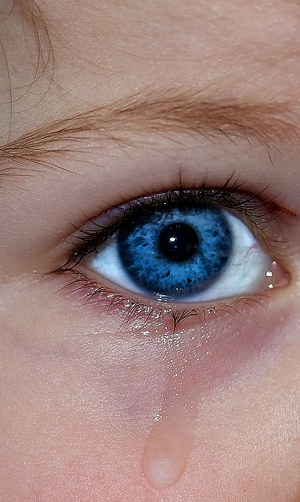
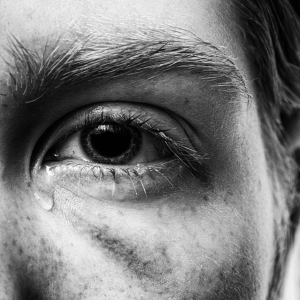

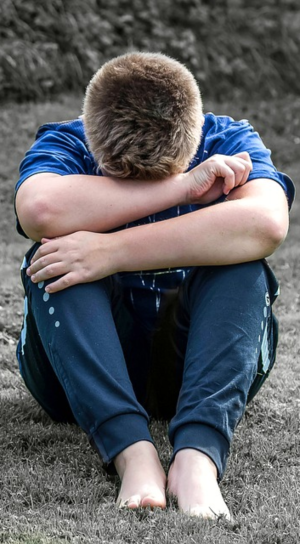
This post has been voted on by the steemstem curation team and voting trail.
There is more to SteemSTEM than just writing posts, check here for some more tips on being a community member. You can also join our discord here to get to know the rest of the community!
My lovely people... 💚💚💚
Great Post 😆
Congratulations! This post has been upvoted from the communal account, @minnowsupport, by zen-art 💚 from the Minnow Support Project. It's a witness project run by aggroed, ausbitbank, teamsteem, someguy123, neoxian, followbtcnews, and netuoso. The goal is to help Steemit grow by supporting Minnows. Please find us at the Peace, Abundance, and Liberty Network (PALnet) Discord Channel. It's a completely public and open space to all members of the Steemit community who voluntarily choose to be there.
If you would like to delegate to the Minnow Support Project you can do so by clicking on the following links: 50SP, 100SP, 250SP, 500SP, 1000SP, 5000SP.
Be sure to leave at least 50SP undelegated on your account.
Oh, Petra. You've done it again. An entirely fabulous post on an entirely unexpected subject.
A couple of personal observations. Not just a needle will make your eyes water. In my street fighting days I wanted to get a shot on his nose early. It didn't even have to be that hard to start the tears. It was an advantage.
I don't have reflexive tears in my right eye, I don't have a cornea. I seem to get some sympathetic basal tears when I am chopping lots of onions or riding in a really smoky condition. It is a situation where the body 'makes up' for a non functioning part. I also hear better in my right ear than left.
That paragraph that ends with "take the blue pill" is a masterwork all by itself. Incredibly memorable writing.
Thank you. Thank you. Marvelous post that hits pretty close to home.
Hihihi, somehow I knew you would appreciate that paragraph, you always get my subtle humor :D
Thank you for your feedback honey 💚
Hello there @zen-art :)
This is one of the most beautifully formatted posts I have ever come across! What a pleasure to read such a carefully thought through work.
I have just one question for you regarding the bio-chemistry of this topic.
Do stress hormones cause stress?
I am interesting in learning about this a little more because I thought that it was only the response to stress that caused their levels to change. Like for example enhancing secretion of glucocorticoids, which in tun, if not regulated properly can be detrimental to our physical and mental health.
I really like the way you addressed self-criticism here and also, the way you integrated evolutionary biology/psychology in this discussion :)
Beautiful write-up!
:D :D :D It should say "they are caused by stress" , see, this is why I appreciate a good reader. Thank you so much for that observation. No matter how many times I read a post before publishing it, there are always some things that I look over :) The post is updated now.
Thank you for your lovely words, I am glad you enjoyed the text and appreciated my efforts to make it easy and interesting on the eyes. Your support is very much appreciated! 💚
Oh, Thank you for your prompt reply! :) I enjoyed it very much by the way!
All the best to you.
great post, really well researched and written as soon as I read that we are the only animals to dry from emotion I went to fact check remembering Koko the gorillas morning of the loss of her pet kitten and thought she may have cried but nope.
There appears to be an evolutionary pressure for other animals to conceal their emotions.
This surprised me too because animals can cry just not in response to emotion, I did not know that until a couple of days ago.
If you had asked me if tears had a complex composition, I'dd answer that I'd never thought of it but would assume so. I wouldn't have guessed that there were multiple types. Really cool stuff!
Oh yeah, not one, not two but three types and it is pretty cool indeed :)
You would think, with how much time I spend crying (I'm the designated weeper in my family...LOL), I'd be an expert. Well, after reading this awesomesauce post, now I feel like I am! 😊
Thanks for sharing all this great info, @zen-art! Love your nose piecing story - I've had a somewhat similar experience, but it was to do with hormonal crying (the joys of menopause...NOT!). My family knows that occasionally I'll start crying for no apparent reason, and just go with the flow...literally! 😜
However, they also know that if we're all watching TV together, and a sad commercial comes on, what will happen. In fact, they usually all turn to look at me (in unison), as I quietly start to sniffle, and I'll reply something like, "Cut it out!" and we'll all laugh, even as I sob. 😂
Oh, and one last thing - my feelings about your statement...
but take your brain with you."
via GIPHY
I looooooove that gif!!! There is so much emotion in it!!! Thank you so so so much honey, I can feel the love and am sending it so much back to you 💚💚💚
via GIPHY
This is such a lovely journey of information to go through. I’ve always been fascinated by how tears operate, a youtuber was making an apology the other day and got only dislikes only because she didn’t pour tears. So many factors about tears that really pull my interest. Thanks for this post.
Thank you for your feedback, I am glad you enjoyed the read 💚
Your post raised so many thoughts and ideas in my mind – a real education, on something we all take for granted! Eg, the word lachrymose for tearful is clearly derived from the word for the lacrimal gland. I never knew dat!
One thing this post really made me think about is the connection between mind and body, which although accepted, is still considered to be on the fringes of conventional medicine in some respects. Yet it's so clear. Sad thoughts enter our mind and are transmitted to our gut via the gut-brain connection... I'm thinking about the way that sobbing starts, with the stomach area lurching... and then tears are produced. This seems to me a clear illustration of how the mind and body are connected, and why certain thoughts can literally make us ill – or make us better!
It is not on the fringes anymore, at least not around people who know about chemistry. Everything in our bodies is connected and thoughts are extremely powerful. Thank you for your lovely comment 💚